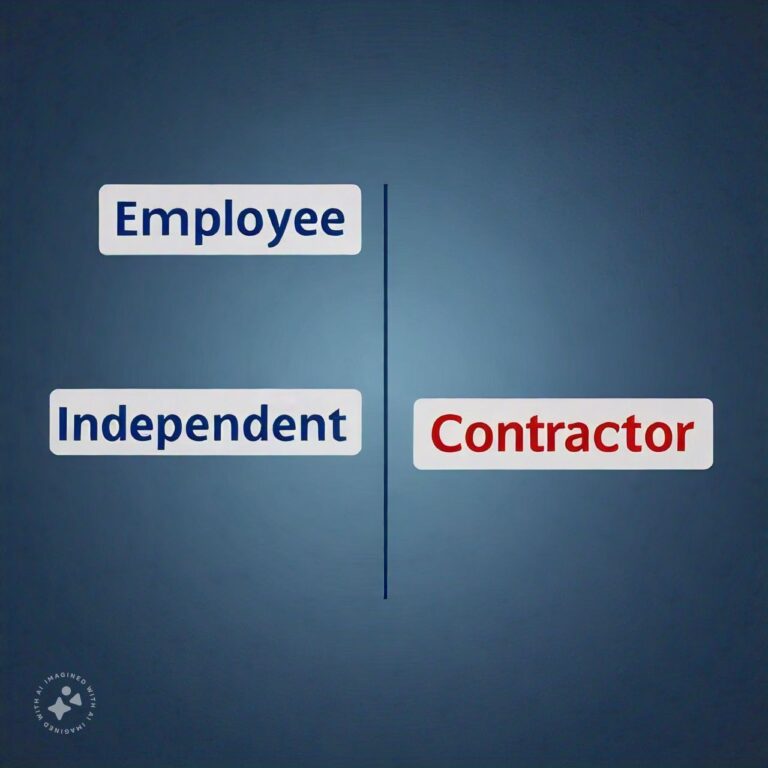
Differences Between Employee and Independent Contractor
The distinction between an employee and an independent contractor plays a crucial role in modern business environments. Both employees and independent contractors contribute significantly to the workforce, but they differ in terms of legal rights, responsibilities, compensation, and tax implications. Understanding these differences is critical for both businesses and workers, as they affect everything from tax reporting to benefits and job security.
An employee typically works directly for an employer, who controls the worker’s tasks, schedule, and method of work. Employees are entitled to benefits such as health insurance, retirement contributions, and paid time off. Conversely, an independent contractor is a self-employed individual who provides services to a client or company under a contract but retains control over how the work is completed. Independent contractors are responsible for their own taxes and do not receive benefits like employees. Both models of work have advantages and disadvantages depending on the nature of the job and the preferences of the worker and the employer.
Employee Overview
What is an Employee?
An employee is a person who works for a business or organization under a contract of employment. The employer exercises a significant level of control over the employee’s duties, working hours, and how tasks are performed. Employees typically work under the direct supervision of a manager or supervisor and follow the company's rules, policies, and procedures.
Key Features of an Employee
Employees have a structured relationship with their employer, with clear expectations about job duties, working hours, and performance evaluations. This relationship often includes a higher level of job security and protection under labor laws. Employers are required to comply with labor regulations, including minimum wage, overtime pay, and anti-discrimination laws. Additionally, employees are entitled to various benefits depending on the employer’s policies, such as health insurance, retirement plans, and paid leave.
- Work Environment: Employees usually work at the employer’s premises or remotely under the employer’s supervision. The employer provides the tools, equipment, and training necessary for the job.
- Compensation: Employees are paid regularly (weekly, bi-weekly, or monthly) with taxes automatically deducted from their paychecks by the employer. They may also receive bonuses, stock options, or other financial incentives.
- Benefits: Employees are entitled to various benefits, such as health insurance, retirement contributions, paid vacation, sick leave, and, in some cases, bonuses or profit-sharing plans.
- Legal Protections: Employees benefit from labor laws that protect against unfair dismissal, workplace discrimination, and unsafe working conditions. They are also covered by workers’ compensation if they are injured on the job.
Responsibilities and Taxes
Employers have significant responsibilities toward their employees. They are required to withhold income tax, Social Security, and Medicare taxes from employee paychecks. Additionally, employers must pay unemployment taxes and contribute to workers’ compensation insurance.
Employees themselves have fewer tax responsibilities because their employer handles the bulk of their tax obligations. At the end of the tax year, employees receive a W-2 form, which outlines their total earnings and the taxes withheld. This form is used when filing income tax returns.
Independent Contractor Overview
What is an Independent Contractor?
An independent contractor is a self-employed individual who provides services to businesses or clients under a contract. Unlike employees, independent contractors control their own work schedules, methods of completing tasks, and often work for multiple clients simultaneously. They are considered business owners in the eyes of the law and are responsible for their own taxes, insurance, and other expenses.
Key Features of an Independent Contractor
Independent contractors operate with a greater level of freedom than employees. They are hired by companies to complete specific projects or provide ongoing services, but they have more control over how and when they work. Contractors may be freelancers, consultants, or other professionals who run their own businesses.
- Work Environment: Independent contractors work independently and are typically responsible for providing their own tools, equipment, and materials. They decide when and where to work, as long as they meet the agreed-upon deadlines.
- Compensation: Contractors are usually paid on a per-project basis, hourly rate, or a predetermined fee agreed upon in a contract. Unlike employees, independent contractors do not receive regular wages but invoice their clients for completed work.
- Benefits: Independent contractors are not entitled to employee benefits such as health insurance, retirement plans, or paid time off. They must arrange and pay for their own benefits and insurance.
- Legal Protections: Contractors do not have the same legal protections as employees. For example, they are not covered by anti-discrimination laws, minimum wage laws, or unemployment benefits. However, they retain the right to negotiate contract terms and are generally protected by contract law.
Responsibilities and Taxes
Independent contractors are responsible for handling their own taxes. They must file self-employment taxes and make quarterly estimated tax payments to cover their income tax, Social Security, and Medicare taxes. Contractors do not receive a W-2 form; instead, they receive a 1099-NEC form if they earn more than $600 from a single client in a year.
Because independent contractors are essentially running their own businesses, they can deduct various business-related expenses, such as office supplies, equipment, and travel costs. These deductions reduce their taxable income, providing some financial relief from the higher tax responsibilities they bear.
Differences Between Employee and Independent Contractor
- Control Over Work:
- Employee: The employer has control over the work performed, hours, and how tasks are carried out.
- Independent Contractor: The contractor controls how and when the work is done, within the parameters of the contract.
- Payment Method:
- Employee: Employees are paid on a regular basis (hourly, salary, or commission) and have taxes withheld from their paychecks.
- Independent Contractor: Contractors are usually paid per project or per hour and must invoice clients for payment.
- Tax Responsibilities:
- Employee: Taxes are withheld by the employer, and the employee receives a W-2 form for tax filing.
- Independent Contractor: Contractors must handle their own taxes, including self-employment tax, and receive a 1099-NEC form if they earn more than $600 from a client.
- Benefits:
- Employee: Entitled to benefits such as health insurance, retirement plans, and paid leave.
- Independent Contractor: Not eligible for employer-provided benefits and must arrange their own insurance and retirement plans.
- Job Security:
- Employee: Generally has more job security and legal protections, including unemployment benefits and workers’ compensation.
- Independent Contractor: Operates on a contract basis with less job security and no access to unemployment benefits.
- Legal Protections:
- Employee: Protected by labor laws, such as minimum wage, overtime pay, anti-discrimination, and workplace safety regulations.
- Independent Contractor: Not protected by labor laws but can rely on contract law for protection in business agreements.
- Workplace Location:
- Employee: Typically works at the employer’s location or under the employer’s supervision, whether remotely or on-site.
- Independent Contractor: Chooses their own work location and schedule, as long as they meet project deadlines.
- Tools and Equipment:
- Employee: The employer provides the tools, equipment, and training needed to complete the job.
- Independent Contractor: Responsible for providing their own tools, equipment, and any necessary training.
- Contracts:
- Employee: Works under an employment contract that outlines job duties, pay, and benefits but with less freedom to negotiate individual terms.
- Independent Contractor: Works under a specific contract for each project or client, with the ability to negotiate contract terms.
- Workload Flexibility:
- Employee: Typically works for one employer and follows a set schedule, with limited flexibility in workload and time off.
- Independent Contractor: Can work for multiple clients simultaneously and has greater flexibility in managing workload and time off.
Conclusion
Understanding the differences between an employee and an independent contractor is crucial for both businesses and workers. Employees enjoy the benefits of job security, regular pay, and various benefits such as health insurance and retirement plans, all while having their taxes managed by their employer. They also benefit from labor law protections and a structured work environment.
On the other hand, independent contractors have the freedom to control their own work schedules, choose their clients, and operate like business owners. However, they bear greater responsibility for their taxes, insurance, and retirement planning, and they do not enjoy the same legal protections or benefits as employees.
The choice between being an employee or an independent contractor depends on individual preferences, job requirements, and financial goals. For businesses, classifying workers correctly is essential to avoid legal issues and ensure compliance with labor laws. Both working arrangements have their advantages and disadvantages, and understanding these differences allows workers and employers to make informed decisions that align with their needs and objectives.
FAQs
Related Topics
- All
- Animals
- Diseases
- Health
- Money
- Politics
© 2024 OnYelp.com. All rights reserved. Terms and Conditions | Contact Us | About us





